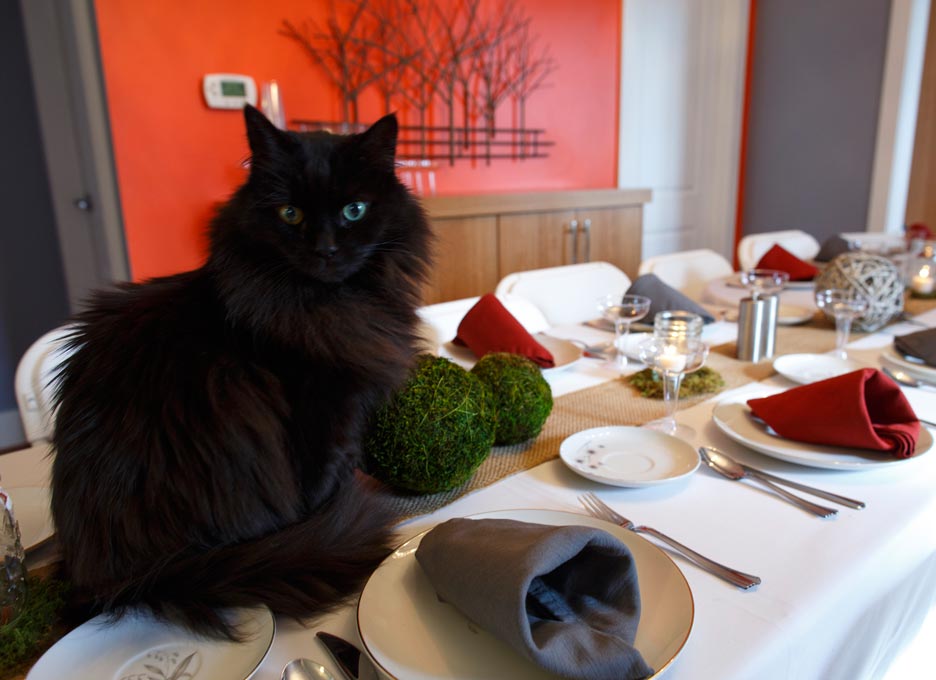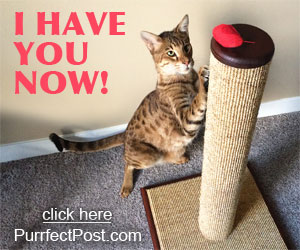Keep Your Cat Safe and Happy During The Holidays

"Home for the holidays." "Thanksgiving dinner." These phrases conjure up cherished memories of family feasts, reconnecting with old friends, and welcome respites from work. True, these same phrases might also trigger angst about harried trips to the mall, relatives who don't get along, and way too many calories. But even with its commercialization, pressures, and occasional heartburn, we generally love this time of year. We feel invigorated, and for at least a while we can envision peace and goodwill.
"The holidays" and "Thanksgiving dinner" should also set off alarms if you live with a precocious kitten or a sedate feline who's been in the family for years. Thanksgiving, Christmas, Hanukkah, Kwanzaa, and New Year's Eve pose all kinds of risks for cats. But with some planning, proactive safeguards, and a keen awareness of the dangers of the holiday season, you and your kitty should have a joyous and festive time—and even sneak in your fair share of catnaps.
The rest of this article focuses on three areas of concern: rich and overabundant food, crowded households, and holiday greenery.
But Before You Read Any Further . . .
Here are two preventive steps you can take right away. They take almost none of your time, but they may be lifesavers. If you've already done them, you deserve a pat on the back and some appreciative purrs.
- Find out the phone number and location of the nearest 24-hour veterinary clinic. Post this information in a convenient place, such as the refrigerator, and also keep it in your wallet or purse. If an emergency occurs on a night, weekend, or holiday, the last thing you want to be doing is searching for a vet's office that's open.
- Do the same thing with the Animal Poison Control Center (ASPCA). Their number is 888-ANI-HELP, or 888-426-4435. There may be a fee charged to your credit card when you use them, though the cost may be a bargain because it can be life-saving.
Microchipping and Identification
Although we don't like to think about it, the risks of kitties getting loose—not to mention disoriented—outdoors increases during the frenzy of the holidays. Microchipping is a way to give your cat permanent identification should she get lost. In addition, now is a good time to consider outfitting your kitty with a breakaway collar and attached ID tag. These safety measures help ensure that your kitty stays safe and sound—and ultimately with you—in case the unexpected happens.
Institute "Safety First" Kitchen Practices Well Ahead of Time
Teach your kitty that the stove and areas adjacent to it are out-of-bounds. Clap your hands, say "No" in a tone and volume that is not frightening but indicates that you mean business, and/or lift the kitty up and place her in a suitable spot if she wanders too close to the stove.
Given that the kitchen is often a sensory wonderland and that kitty enjoys being where you are, a compromise solution that often works is to designate and/or prepare places in the kitchen in which your kitty is allowed and that enable her to enjoy your company and the ambiance without getting in the way or putting her or you at risk. A footstool, a special chair, a windowsill, a cat condo, even a section of the counter that is not near the stove—all of these are potential cat-safe and cat-allowed kitchen areas.
Get into the habit of turning off all burners on the stove if you have to take your attention away from cooking for even a minute. This may seem excessive—until you have a conversation with a firefighter and ask what he or she has seen. Learn more in the article "Fire Safety for Cats."
If at all possible, feed your kitty her dinner before preparing yours. Not only will this very likely satisfy her appetite, but she may also go into the next room to wash off, as cats typically do—buying you at least a few minutes of time to do kitchen chores without a curious kitty complicating matters.
Remember that cats are stealthy; although this may be second nature for those who have lived with cats for any length of time, try to develop the habit of looking down from time to time when in the kitchen. Cats can be at the other end of the house and an instant later seemingly have teleported themselves to the kitchen floor next to your feet.
Unsafe Foods for Cats
General Considerations
"Just say no" when your cat begs for food from the holiday table, and keep your kitty away from holiday food in general. Holiday feasts and snacks tend to be high in fat, sugar, seasonings, and other ingredients that can cause severe digestive problems—and possibly an emergency trip to the vet—when ingested by cats.
Turkey-Related Foods
A bit of turkey (three or four small pieces) is fine as a treat for your kitty, but there are some risks:
- If the kitty isn't used to turkey, it may make her sick.
- The richness and novelty of the turkey may inspire the kitty to pester you for more.
- The turkey may be basted with ingredients that are unhealthy for cats. To be on the safe side, rinse off any pieces of turkey you give to your kitty.
- Avoid feeding your cat raw turkey. Bacteria such as Salmonella, Listeria, and Campylobacter are common in raw or undercooked poultry products (including most labeled "free-range").
- You probably already know this, but it doesn't hurt to repeat it: Put the turkey in your kitty's bowl. Avoid hand-feeding her to discourage begging.
- Cooked organ meat is OK for cats in small amounts. Some people boil the "innards" that come with store-bought turkeys and feed a few tiny pieces to their cats.
- Do not feed your cat any bones from birds—turkeys, chickens, ducks, geese, etc. The bones are a choking hazard and can splinter and wreak havoc on a kitty's digestive system.
Other Common Holiday Foods
Keep the following ingredients out of reach of your cat. These are common foods we have around the house but that may be more plentiful during Thanksgiving and the holidays that follow. Note that these items may be more accessible than usual to your cat if you serve a buffet-style banquet.
- Onions and anything in the onion family, including garlic and leeks cause anemia in cats. Onions are a very common ingredient in sauces, gravies, side dishes—everything, really.
- Mushrooms are common in gravy, stuffing, and other dishes. There are many forms of mushrooms, varying in toxicity. Best to be safe and avoid giving cats any mushrooms.
- Gravy typically contains lots of onions and garlic; mushrooms are a common ingredient as well. Commercial gravy packets may also be very high in salt.
- Grapes and raisins contain unidentified toxins which make dogs very sick. But the ASPCA advises not to give grapes or raisins to cats as well.
- Tomatoes and tomato products and raw or green potatoes come from members of the Solanaceae family of plants, which have been shown to wreak havoc on the lower gastrointestinal tract of cats.
- Yeast in rolls has been shown to cause severe gastrointestinal problems in dogs; better not to give them to your cat either.
- Raw egg may cause biotin depletion. Symptoms include hair loss, dermatitis, and stunted hair growth. There is also considerable risk of Salmonella in raw eggs.
- Liver, in excess, may lead to vitamin A toxicity. Be aware that the liver may also be a concentration point for environmental toxins.
- Soy is handled fine in limited quantities by some cats, but it is a common allergen. Tofu may cause loose stools and mucus congestion in cats' lungs. Be aware that soy-based meat-substitute products may be high in salt and spices.
- Chocolate should never be fed to cats or other pets.
- Coffee, cocoa, and other caffeinated foods are off-limits to cats.
- Candy and sweets are, as a rule, not healthy for cats.
- Alcohol is dangerous in any dose to animals (and, at larger doses, to humans). Keep guests (or household members) who have had too much to drink or whose judgment is impaired by alcohol away from your cats and other pets.
You can learn more in the slideshow article "Foods Toxic to Cats."
Popular Holiday Foods That Are Generally Acceptable for Cats in Small Quantities
In general, cooked, unseasoned meat, grains, and vegetables, unless listed above, are OK to feed to your cat in limited "treat" amounts. However:
- Be aware that every cat's system is unique and that a cat's tolerance for any given ingredient may change over time.
- The above list contains the most common food hazards around the holidays, but is not exhaustive. When in doubt, don't feed a substance to your cat.
- Consult with your veterinarian for specific advice about your cat's diet.
Signs of Food Poisoning in Cats
Signs that may indicate that your cat has ingested something toxic include: staggering, labored breathing, vomiting, diarrhea, and tremors. Get your cat help immediately if you notice any of these signs. If not treated right away, your cat may suffer kidney or heart damage. Swallowing harmful foods can, in some instances, be fatal to cats, so you must take these signs seriously; your swift response can make all the difference. Call your regular or emergency vet or the Animal Poison Control Center (888-426-4435) for guidance.
Tips to Prevent Your Cat from Self-Serving the Wrong Foods or Contributing to Calamities
Even if you don't feed your cat inappropriate foods, she may help herself to these foods if they're within her considerable reach. Here are some preventive measures you and your guests can take to help avoid accidental snacks and other mishaps.
- Institute the "safe kitchen" practices laid out earlier in the article. Be extra careful during holidays because there will typically be much more food, richer (and more tempting) smells, and more traffic in and out of the kitchen than normal.
- Keep dishes away from the table edges.
- Feed your cat before you serve festive dinners to your humans so that she won't feel compelled to try to get at your food. Better yet, offer your kitty her own pet-healthy holiday treat in her own secure space away from the dining room. This will curb temptation on both sides of the table.
- Warn your guests to resist feeding your cat food from the meal. Quickly pick up plates of unfinished food that your guests may leave around during or after a meal; your kitty may be waiting for just the chance to get her fill of forbidden foods. In fact, you may want to give your guests—especially your cat-unaware guests—a one-minute rundown on cat-related safety rules. (See the tip about appointing an assistant cat watcher below.)
- Keep a tight lid on your trash. Cats are very quick and clever about scavenging. Remove food waste from the premises (or at least from your cat's reach) as soon as practical.
Guest Control
While humans often enjoy the flurry of people coming and going over the holidays, the same may not be true for your cat. Many cats become stressed from the overload of new sights and sounds and disrupted routines. They may become frightened or aggressive—or even try to escape. To reduce your cat's stress level, do the following:
- Create a safe haven for your cat where she can peacefully stay with all of her personal trappings (food and water bowls, litter box, toys, and scratching pads) during holiday events, such as dinner. Our article on Halloween safety goes into detail on how to implement this safety and stress-reduction measure.
- Prevent small children from bothering your cat. Ask their parents for their cooperation.
- Watch the door! In all the commotion, your cat may try to bolt out of your house. Consider putting up signs on both sides of all doors that lead to the outside.
- Consider appointing an adult whom you trust and who knows about cats as deputy cat guardian. This person (who you may want to reward with a gift certificate or tin of cookies) will make sure that your kitty stays inside and that people either leave her alone or interact with her properly (and with all due deference).
- Keep your cat away from candles, fireplaces, and other flames. Cats can easily start fires if they become curious and investigate the burning object. Learn more in the article "Fire Safety for Cats."
Holiday Plants
It's never too early to think about the plants we bring into our homes during the winter holidays. Many of us start decorating our homes right after Thanksgiving. Before you adorn your home with seasonal foliage, consider which plants may harm your cat. These include lilies, mistletoe, Christmas cacti, holly berries, and poinsettias as well as pine needles which can puncture your cat's intestines or stomach if she chomps on them.
The article "How to Keep Your Cat from Chewing on Houseplants" explains various strategies for protecting your cats and your plants from each other and includes handy lists of plants that are toxic and safe, respectively, for cats. If it's impossible to keep your kitty from nibbling on foliage, consider buying artificial renditions of holiday plants—including Christmas trees—which are basically harmless and can be recycled year after year.
Make Safety a Habit, So You and Your Cat Can Have Stress-Free Holidays
Don't be daunted by all these safety precautions for your cat. Protecting your cat from harmful substances and stress is something you do every day without thinking about it. But since the holidays are a bit more demanding and distracting, you may need to give your cat's well-being extra attention. So put your cat's safety on your holiday to-do list.
You May Also Like These Articles:
Foods Toxic to Cats - Slideshow
Common Plants Poisonous to Cats
Clicker Training for Cats: Come When Called
How Do I Get My Cat into a Carrier?
Training Your Cat To Stay Off The Kitchen Counter
Notice: Ask-a-Vet is an affiliated service for those who wish to speak with a veterinary professional about their pet's specific condition. Initially, a bot will ask questions to determine the general nature of your concern. Then, you will be transferred to a human. There is a charge for the service if you choose to connect to a veterinarian. Ask-a-Vet is not manned by the staff or owners of CatHealth.com, and the advice given should not delay or replace a visit to your veterinarian.






